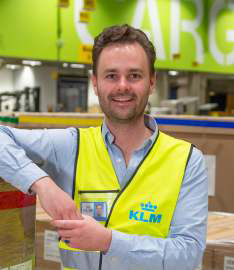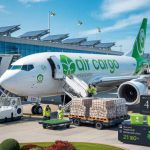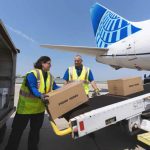Fueling the Future: Investing in a Greener Air Cargo Industry
In this exclusive interview, Air Cargo Update gets first-hand insights from three key figures in the industry on how the sector’s greener landscape is progressing. Michiel Potjer, Chief of Staff to EVP Air France KLM Martinair Cargo and Strategic Sustainability Lead Air France KLM Martinair Cargo, Richard Broekman, Chief Commercial Officer and Head of Sustainability at Atlas Air Worldwide, and a representative from Air Canada Cargo, talk at length on this crucial issue.
 Climate change has cast a long shadow on the aviation industry, and air cargo, with its soaring emissions and critical role in global trade, finds itself squarely in the spotlight. Yet, amidst the challenge lies a beacon of hope: major players are actively embracing sustainability, embarking on a transformational journey to lessen their environmental impact.
Climate change has cast a long shadow on the aviation industry, and air cargo, with its soaring emissions and critical role in global trade, finds itself squarely in the spotlight. Yet, amidst the challenge lies a beacon of hope: major players are actively embracing sustainability, embarking on a transformational journey to lessen their environmental impact.
From pioneering sustainable fuels to leveraging cutting-edge technology, major industry players are redefining the future of air cargo, charting a course toward a more sustainable sky.
But how are industry leaders putting these plans into action? Air Cargo Update had the exclusive opportunity to sit down with three key figures shaping the greener industry landscape, Michiel Potjer, Chief of Staff to EVP Air France KLM Martinair Cargo and Strategic Sustainability Lead Air France KLM Martinair Cargo, Richard Broekman, Chief Commercial Officer and Head of Sustainability at Atlas Air Worldwide, and a representative from Air Canada Cargo.
Read on as we examine this journey and the cutting-edge tactics opening the door for a more accountable sector in the global economy’s quest for a greener future.
Atlas Air Worldwide: Leading the Charge in Decarbonization
Atlas Air Worldwide, a global leader in outsourced aviation services, is at the forefront of the sustainability movement in air cargo. Richard Broekman, Chief Commercial Officer and Head of Sustainability at Atlas Air, underscores the company’s commitment to reducing carbon emissions through a multifaceted approach.
“Atlas works with industry partners, customers, and stakeholders to reduce our carbon emissions in a sector that many view as hard to decarbonize,” says Broekman. “Our decarbonization strategy focuses on sustainable aviation fuel (SAF) use, investment in new aircraft, improved fleet efficiencies, and fuel-saving best practices.”
One of Atlas Air’s key initiatives is its partnership with Airlines for America (A4A) to achieve net-zero carbon emissions in aviation by 2050. By setting a target to reduce absolute Scope 1 emissions by 20% by 2035, Atlas Air is charting a path towards sustainability while actively engaging with partners to drive emission reduction efforts.
Sustainable Aviation Fuels (SAFs) are pivotal in Atlas Air Worldwide’s journey towards net-zero emissions. Broekman emphasizes, “SAF is an important element in our decarbonization strategy given its potential to be the greatest near- and long-term contributor to achieving our ambitious climate goals. That is why we have placed a heavy emphasis on advancing efforts to increase SAF production and distribution. Our fuel procurement team is engaged in ongoing discussions to develop contracts with fuel providers and other fuel partners to support our customers’ growing interest in the use of SAF.”
Broekman also discusses Atlas Air Worldwide’s initiatives in implementing sustainable aviation practices, such as incorporating SAF for flights departing from Zaragoza Airport in Spain, “Most recently, we announced a partnership with our customer Inditex to incorporate 5% SAF (produced by Repsol) for all flights departing from the Zaragoza Airport in Spain. We are the first cargo airline to use SAF regularly on cargo flights [in Spain].”
 From a regulatory standpoint, Atlas Air Worldwide navigates the evolving landscape with a proactive approach. Broekman stresses, “The implementation of the U.S. Federal Aviation Administration’s (FAA) ‘NextGen’ Air Traffic Control (ATC) system presents a significant opportunity for all airlines to execute more efficient arrival and departure procedures by eliminating altitude stepping, thus dramatically reducing fuel burn and emissions.”
From a regulatory standpoint, Atlas Air Worldwide navigates the evolving landscape with a proactive approach. Broekman stresses, “The implementation of the U.S. Federal Aviation Administration’s (FAA) ‘NextGen’ Air Traffic Control (ATC) system presents a significant opportunity for all airlines to execute more efficient arrival and departure procedures by eliminating altitude stepping, thus dramatically reducing fuel burn and emissions.”
Atlas Air Worldwide’s dedication to sustainability and net-zero emissions exemplifies its leadership in the air cargo industry. Through collaboration, innovation, and advocacy, the company strives to create a greener future for aviation while fulfilling its role in global trade and transportation.
Air Canada Cargo: Charting a Course Towards Net-Zero Emissions
As one of Canada’s largest air cargo carriers, Air Canada Cargo is embracing sustainability as a core tenet of its business strategy. A representative from Air Canada Cargo, speaking on the company’s behalf, highlights the company’s strategies and initiatives aimed at achieving net-zero emissions by 2050.
“Environmental sustainability will continue to be a key focus for both customers and our business in 2024. Air Canada’s customers have an increased interest in our environmental sustainability projects, and we’ve been proud of our Environmental Affairs group who are always looking for ways to mitigate our environmental footprint,” says the representative. “We’ve made significant strides in converting operational vehicles to electric, adopting sustainable packaging materials, and creating more efficient processes.” Additionally, the company is committed to achieving ambitious greenhouse gas (GHG) net-reduction targets for 2030, including a 20% reduction in GHG emissions from air operations and a 30% reduction from ground operations.
Sustainable Aviation Fuels (SAFs) play a central role in Air Canada’s climate objectives. The representative further stresses, “SAF is one of the four carbon reduction pillars of our Climate Action Plan, which aims to achieve net-zero carbon emissions by 2050.” To further support this goal, Air Canada has committed to investing $50 million in SAF by 2030, along with other low-carbon aviation fuel (LCAF) development efforts.
Operational efficiency measures are integral to Air Canada’s efforts to minimize fuel consumption and environmental impact. The representative underscores, “The Fuel Efficiency Initiative, led by Air Canada’s Operational Excellence department, is mandated to unify all of Air Canada’s aircraft-related fuel and energy reduction initiatives.” In 2022, fuel efficiency initiatives resulted in significant jet fuel savings and CO2e emissions avoidance. Air Canada has also resumed procurement of SAF and started purchasing renewable natural gas (RNG) for its facilities to further reduce emissions.
From a regulatory perspective, Air Canada recognizes the importance of collaboration and investment to meet carbon reduction targets. The representative expresses, “SAF is a critical component of our global industry’s sustainability but is not currently available in Canada. Air Canada is working with stakeholders and governments to establish a competitive investment climate and develop a concrete action plan for the production and supply of SAF in Canada.”
Air Canada’s dedication to environmental sustainability and net-zero emissions underscores its leadership in the aviation industry. Through innovative initiatives, strategic partnerships, and regulatory advocacy, Air Canada is paving the way toward a greener future for air travel
Air France KLM Martinair Cargo: Setting the Standard for Sustainable Airfreight
With a legacy of sustainability spanning decades, Air France KLM Martinair Cargo is setting the standard for sustainable airfreight transportation. Michiel Potjer, Chief of Staff to EVP Air France KLM Martinair Cargo and Strategic Sustainability Lead, provides insights into the company’s comprehensive sustainability strategy.
“At Air France KLM Martinair Cargo, we’ve embedded sustainability into the core of our strategy,” says Potjer. “Our vision is to become a leader in sustainable airfreight, passionately delivering best-in-class customer experiences while reducing our environmental footprint. We translated our new AFKL Group purpose into a 2030 vision for our Cargo domain. In early 2023, we renewed our cargo vision 2030, which is now: To become a leader in sustainable airfreight, while passionately delivering best-in-class customer experiences.”
Acknowledging the complexity of the aviation industry’s environmental challenges, Potjer underscores the importance of collaboration and shared responsibility. “We recognize that reducing our environmental footprint is not a standalone endeavor; we must confront environmental challenges in close collaboration with our ecosystem partners.”
Air France KLM Martinair Cargo’s sustainability initiatives are aligned with its Destination Sustainability Roadmap and United Nations Sustainable Development Goals (SDGs). Potjer further says, “Our ambitions were validated by the Science Based Targets initiative (SBTi), primarily centered around reducing our direct and indirect CO₂ emissions, giving us a clear path towards 2030.”
The company’s Destination Sustainability Roadmap outlines ambitious targets, including a 30% emission reduction per RTK/km by 2030. To achieve these targets, Air France KLM Martinair Cargo focuses on fleet renewal, sustainable aviation fuels (SAF), and operational measures.
- Fleet Renewal: The company has announced a firm order for A350F aircraft, which emit over 40% less CO₂ than their predecessors, contributing to a reduction in overall emissions.
- Sustainable Aviation Fuels (SAF): Air France KLM Martinair Cargo has implemented the Cargo SAF Programme, enabling customers to fuel their flights with SAF. The company also introduced the goSAF ancillary in its booking platform, allowing customers to contribute to SAF usage.
- Operational Measures: Operational initiatives include reducing non-recycled waste, achieving zero emissions ground operations, and optimizing cargo load planning.
While Air France KLM Martinair Cargo primarily focuses on long-haul flights, Potjer highlights the company’s involvement in exploring alternative fuels and technologies for short-haul routes, particularly through collaborations with Air France and KLM.
Potjer concludes by emphasizing the company’s commitment to navigating regulatory and policy dynamics in alignment with global sustainability initiatives. He stresses, “Our approach in Cargo aligns closely with the expertise of Air France, KLM, and the broader Group in navigating evolving landscapes for carbon reduction targets.”
Air France KLM Martinair Cargo’s sustainability initiatives encompass fleet renewal, sustainable aviation fuels, and operational measures aimed at reducing emissions across its supply chain. By aligning with the United Nations Sustainable Development Goals and embracing the Science Based Targets initiative, the company is charting a course towards a more sustainable future.
Driving Innovation: Advancing Sustainable Aviation Technologies
Beyond their initiatives, these companies are collectively driving innovation in sustainable aviation technologies. From the adoption of electric flight and hydrogen-powered aircraft to the development of biofuels and synthetic kerosene, the air cargo industry is exploring a wide range of solutions to decarbonize air transportation.
“Electric flying and hydrogen-powered aircraft represent promising avenues for reducing emissions in the aviation sector,” says Potjer. “By actively supporting various technologies, including electricity, hydrogen, and hybrid solutions, we’re accelerating the transition to zero-emission flights.”
Similarly, Atlas Air Worldwide and Air Canada Cargo are investing in sustainable aviation fuels and fleet modernization to achieve their carbon reduction goals. By leveraging partnerships and collaboration, these companies are driving the adoption of innovative technologies that promise to reshape the future of air cargo transportation.
Navigating Regulatory Landscapes: Overcoming Challenges and Seizing Opportunities
Despite the progress made in advancing sustainability, the air cargo industry faces regulatory and policy challenges that require concerted efforts and collaboration. Broekman emphasizes the importance of strong partnerships with stakeholders and regulatory organizations to navigate evolving landscapes for carbon reduction targets.
“At Atlas Air, we recognize the importance of collaborating with industry peers, customers, and regulatory bodies to drive meaningful progress towards decarbonization,” says Broekman. “By advocating for policies that support sustainable aviation fuels and investing in technology solutions, we’re positioning ourselves to meet the challenges of tomorrow.”
Similarly, Air Canada Cargo and Air France KLM Martinair Cargo are actively engaged in initiatives such as the Smart Freight Centre, which aims to unite stakeholders in the air transport sector and drive decarbonization measures. By leveraging increased transparency of greenhouse gas emissions from air freight services, these companies are contributing to the development of industry-wide standards and best practices for sustainability.














